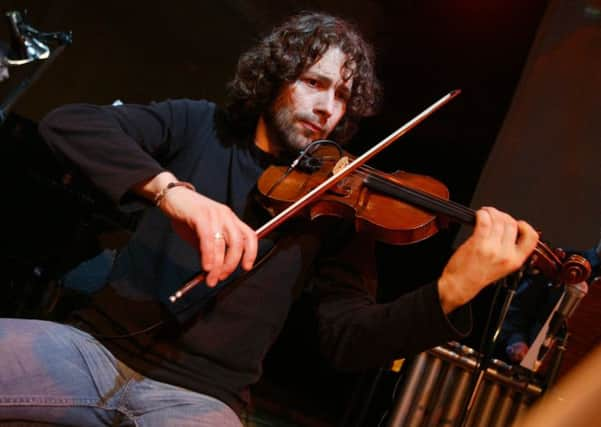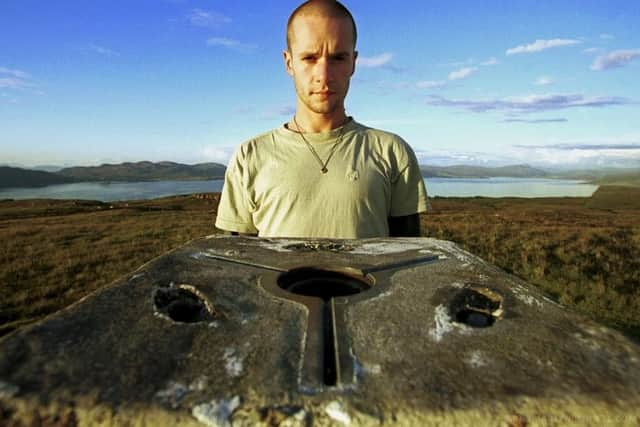Greg Lawson on honouring Bennett with Nae Regrets


ONE of the great things about Celtic Connections is the way it enables ambitious feats of musical collaboration that would not happen otherwise – and never more so than with this year’s opening concert, in which 80 musicians and singers will mark the tenth anniversary of Martyn Bennett’s death with a live orchestral version of his seminal final album, Grit.
Nae Regrets is written and directed by Greg Lawson, a violinist with the BBC Scottish Symphony Orchestra and a friend of Bennett’s, whose diverse musical interests have taken his orchestral work through rock, folk, Salsa Celtica and Balkan fusion band Moishe’s Bagel. Sitting with a black coffee in a café near his home in Glasgow, Lawson admits that the project is keeping him awake at night. “This is more stress than I think I’ve ever felt in my life. I’m writing something that doesn’t exist, into a form that does exist, using musicians who have never played in a group like this – some of them don’t read music – and all that has to happen with six hours’ rehearsal.”
Advertisement
Hide AdThen there is the complexity of scoring Grit, an album made entirely at a mixing desk, for live performance. A complex and groundbreaking fusion of sampled dance beats, string arrangements, traditional songs and a host of desk-created sounds, it presents major technical challenges. Some might even advise against it on principle. Such a perfectionist was Bennett in his music-making that director Cora Bissett, when making GRIT: The Martyn Bennett Story last year, was advised to use the album itself rather than try to recreate the music with a live band.


But Lawson has always seen it differently. “What happens with albums and iconic people is that you don’t interact with them any more. Martyn is like a beautiful mountain that people drive to the foot of and admire, but we don’t go up it. The result is that people don’t play his music. That was my overwhelming desire: I want to play this piece, I want people to hear this piece, and I want it to be a live experience.”
He believes that if Bennett had lived, he would have gone on to compose orchestral works. “When I first heard Grit, I thought, ‘My god, what have you done? You’ve taken traditional music and you’ve put it into a framework which is bigger than the normal landscape you would put it in. It’s orchestral, there’s no other way round it. He wrote an orchestral piece, he just didn’t use an orchestra.
“For a long time, I was afraid of people’s expectations. I’m a fiddle player and, suddenly, through deciding to write music for a dead friend, I’m going to be standing up in front of 2,500 people in the Concert Hall. But we all know what the album is, and we all know that this concert is not going to be just turning up and listening to the album really loud in a big room. It’s a retelling with live musicians playing instruments in odd combinations. It will sound like Grit, but it will also sound like something else.”
Lawson first met Bennett when the artist was a young piper, hired as a session musician by Scottish Ensemble. Having played the Northumbrian pipes himself, Lawson sought to stand up for the young lad whose pipes came in for some ridicule from the other classically trained musicians in the group, though he says that Bennett’s energy, friendliness and conspicuous talent soon won them over.
Bennett was then 16, an award-winning piper and the first person to be accepted for City of Edinburgh Music School on a traditional instrument. He was considering training as a classical violinist at the then RSAMD. Lawson, who had recently trained at the Northern College of Music, was critical of how his teachers had dismissed his interest in folk and rock. “The nature of our discussions was always: is it possible to combine sincerely two very, very different things? Do you have to make a decision at some point about who you are and where you settle, or can you really combine? There is conflict in the combination and there is reciprocity.”
Advertisement
Hide AdBennett did train as a violinist at RSAMD, but continued to pursue his interest in folk and traditional music. After graduating in 1993, he burst on to the folk scene as a piper and multi-instrumentalist, a dreadlocked virtuoso who fused traditional sounds with dance beats. He was treated successfully for Hodgkin’s lymphoma in his early 20s, but when the disease returned he withdrew from performing, living on the Isle of Mull with his wife Kirsten and making music electronically.
“The thing not to forget about Martyn is that his level of musicianship was higher than the rest of us,” Lawson says. “He was exceptional. It’s easy to blow someone up a bit when they’re dead because they’re not here to ruin it, but he was a sublime musician. I talked briefly with him about the idea of my writing his music for orchestra, and he intimated that he was pleased about that, but that I probably wouldn’t do as good a job as he would – to which I completely agreed.”
Advertisement
Hide AdLawson has been working on the score for Nae Regrets for over a year, attempting to disentangle the precisely interwoven layers of sound on the album and work out how to recreate them on orchestral instruments. His “orchestra” has a section of low reed instruments, cellos and double basses, to beef up the bass section, and extensive percussion and drums. The more he examined Grit, the more it surprised him.
“It’s more beautiful than I thought, more fascinating. Everything he wrote is perfect, every sound that he makes is there for a reason. It doesn’t matter how much complexity you bring to it, it’s got more. It has been the musical equivalent of untying a pretzel. It looks like it should be possible, but it isn’t. Some of it has been really interesting and enjoyable, some of it has been really difficult and confusing. I thought about abandoning the idea about a thousand times.”
When he started looking for musicians – drawing on folk, classical and jazz traditions – he was nearly swept away on a tide of enthusiasm. Each, as they signed up, received a copy of Grit. Lawson grins: “I hope that right now there are musicians all over the country listening to it and thinking, ‘How...?’”
He says he has been able to draw on his own diverse musical experience for the project, much as Bennett did. “I think the one thing that makes crossover work is knowing both worlds. This idea has been floating around in my head for about 11 years. Every year I wanted to do Grit, but I chickened out because I felt I didn’t know enough. In some ways, I’ve spent the last 10 years pushing myself, exploring lots of different things as a musician, going down avenues I wouldn’t normally go down, to try and acquire as much confidence and knowledge as I can, to then have the audacity to try and do this.
“I think all musicians in every genre should be interested in every other genre of music because they all contain elements of each other. If you want to learn about rhythm, play in a salsa band. And yet music is still in its own camps, with a flag on top and a fence of fear around each form. We should all stop looking at what we can’t do ourselves and learn from each other.”
When he is in danger of losing heart, he recalls a film clip from a BBC documentary of Bennett at his mixing desk. “He’s saying, ‘That’s a dance beat, and this isn’t. What am I doing here? Can you put these things together? Is it musically appropriate?’ I have a similar feeling about this project. Here is an album made up entirely of samples and massive amounts of production, and here is an orchestra, is this going to work? But you never know until you make it, that’s the thing about art, you think really hard about it, imagine all the possibilities, and hope you’ve made the right decision.
Advertisement
Hide Ad“If I’m stuck, I always ask him what he would do. Sometimes I do what I think he’d do, other times I completely disagree with him. But I am absolutely without a doubt that he would have done something better – and I’m completely happy with that.” n
• Nae Regrets – Martyn Bennett’s Grit is at Glasgow Royal Concert Hall, Thursday, www.celticconnections.com